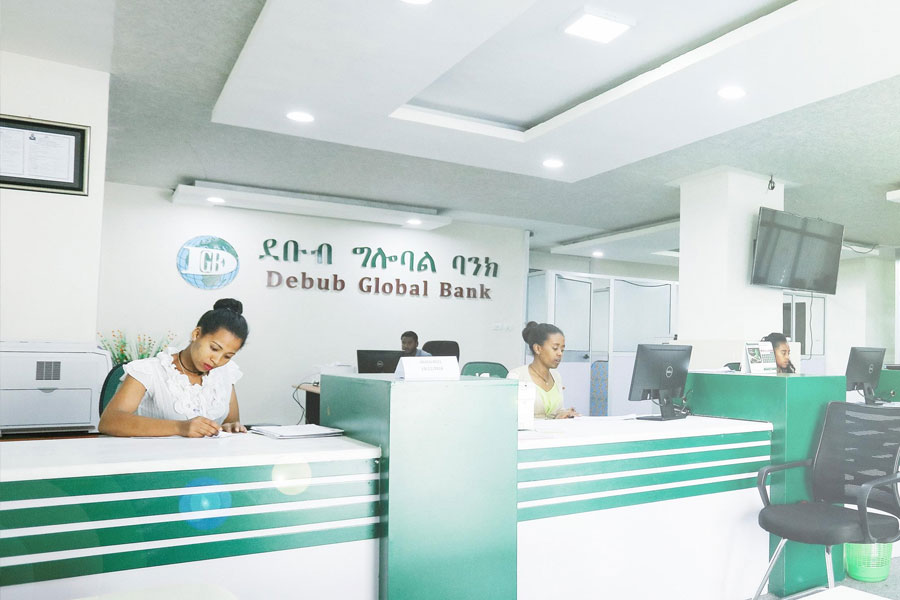
Radar | May 14,2022
They say, fortune favours the bold and the brave. But that is not necessarily the case, as Bethlehem Shakuna will be the first to tell you. For the brave and bold miners who are out digging for gold 12 hours a day in the small town of Gogle, Bero Wereda, down south in West Omo Zone, it is a game of pure luck.
"You could be digging for 20 years and only be able to feed yourself and secure a place to live," Bethlehem said.
On the other hand, you could also make around a million Birr digging through one auspicious hole, like the 30-year-old and his friends had nearly four years ago.
"I am one of the lucky ones," said the gold miner, who has been mining since his high school days. "I hit the jackpot a few months after the government initiated us into an association and gave us land to work on."
This was in 2016, three years after he finished 10th grade and turned his summer exploits into a full-time occupation. Since then, he has been serving as chairperson for an association of 200 miners in his neighbourhood.
"It's very difficult in the beginning," he said. "I spent whatever money I made and lived in a house with 20 other friends who were also miners."
The community in the Shola Kebele, where the miners live, nearly five kilometres away from the mining site is a very tight-knit one. They work and live together.
It takes at least four miners to discover gold. One person is tasked with digging the hole, down to six kilometres into the earth, until they reach the sweet spot dubbed letowhere gold is supposedly waiting to be extracted. Another hauls the dug-up earth in a bucket that is pulled up by a third, and the final person is in charge of washing the precious gold in a gebete.
It is a physically taxing job, but one that feeds the whole community, according to Bethlehem.
"We share everything, because we know the nature of the job," he said. "You may be lucky today, but tomorrow you may need someone's help."
Bethlehem's lucky strike was how he bought two houses in the neighbourhood, one a small bar, a grocery as it is more commonly known, and the other where he shows movies and football matches through his DStv satellite.
Artisinal miners like Bethlehem, living in different parts of the country, are the main reason that the export from minerals has grossed over 200 million dollars this year, accounting for seven percent of the total export revenue generated by the country. Gold alone accounts for six percent of the country's foreign exchange.
Artisanal miners sell their gold to licensed buyers in the Southern Nations, Nationalities and Peoples' Regional State.
This has boosted mineral exports after consecutive years of a downward spiral that culminated in an all-time low of 49.8 million dollars the previous year. This is in stark contrast to the highest recorded number five years ago of 654 million dollars.
In Southern Nations, Nationalities & Peoples' Regional State, where Bethlehem lives, there has been 341kg of gold mined this past fiscal year, according to Eyasu Mamo, director at the region's Mines & Energy Agency.
"There've been major works undertaken to strengthen this sector," he said. "The price by which the National Bank of Ethiopia buys gold (NBE) has increased, and this has deterred the illegal sale of minerals greatly."
The Agency has also driven up its budget from 800,000 to a little over one million Br, dedicated to getting more professionals involved in staking out areas for mining and allocating more security personnel according to Eyasu.
"The area is on the border with Gambela," he said. "It's known to have an armed militia, so we've deployed additional security personnel."
This has been good news for Bethlehem and his miner friends, who prefer working the night shifts as the weather is less warm.
But the surprising turn of events has come from the effects of the Novel Coronavirus (COVID-19) itself. The border closures enforced to minimise the spread of the pandemic have restricted the illicit trade of minerals across the border, according to the director.
"What has been detrimental to other sectors has benefited this one," he said.
The amendment in the price at which gold is being bought by the NBE has played the biggest role, according to Betru Haile, mineral transaction competence insurance director at the Ministry of Mines & Petroleum.
"The National Bank is now buying gold at a higher price than the global market value," he said. "It has increased the price of gold, scaling up by 29pc compared with the previous price depending on the amount."
This has brought on more licensed gold buyers and miners to sell directly to one of the nine buying stations across the country. Before the changes in the regulation at the end of March, there was a little over 700kg of gold produced in a period of seven months in the country, according to data from the Ministry. However, a total of 2,632kg of gold was produced in the three months following the amendment in pricing.
Ezana Mining Development Plc, currently the most significant player in the field, brought in 700kg. Still, it has been the combined efforts of artisanal miners like Bethlehem that have brought in the bulk, according to Betru.
In Oromia Regional State, the second-highest gold producing region last fiscal year, the artisanal miners are being supported by the government in the form of capital good loans to strengthen their capacity, according to Alemayehu Oljira, the region's mineral administration works team leader.
There are 39 associations in the region.
"They're being assisted with the goal of upgrading them to special small-scale miners," he said.
The region, which produced 30kg in the previous year, brought in 485kg in this one.
It is not just the mining sector that has shown an increase in export revenue, however. The country's total export revenue has increased from 2.7 to over three billion dollars this year due to sectors like coffee, khat, flowers and manufacturing.
Coffee has shown a significant result both in terms of price and value, according to Assefa Mulugeta, director-general of export promotion under the Ministry of Trade & Industry.
"We've yet to get it to the optimum price that it deserves," he said. "But it has reached a record high in terms of the amount exported."
Close to 271,000tn of coffee were exported in the just-ended fiscal year, according to data provided by the Ethiopian Coffee & Tea Authority.
The growth in export revenue, though commendable, has achieved only 80pc of its target. The reasons for this are multi-fold, according to the director-general.
"The country hasn't produced the expected amount," he said. "There are also problems with logistics, market systems and pricing that haven't been solved."
The impact of the pandemic has also been strongly felt in manufacturing, one of the three main categories of export revenue.
"Contract cancellations have impacted the textile and leather industries," he said. The sector, though showing an increase of three percent from the previous year, managed to reach only about 51pc of its goal, 405 million dollars.
With no central regulation by the government, exporting had turned into a means to access foreign exchange by some individuals known as "hit and run" exporters.
These exporters buy the local goods at a higher value, making sure to get hold of the limited local production, over-invoicing, and later selling it at a much lower price to the global market, aka under-invoicing. Money lost in the process is made triple-fold through the import of luxury commodities by the same individuals.
A series of moves that have disrupted the industry in the past five years, this has pushed legitimate export companies to the side, in turn impacting the export revenue of the country.
To counter this practice, the Trade Ministry enacted the export contract registration directive, which came into effect on October 28, 2020.
The Ministry makes sure they are buying at the local market price and ensuring they do not sell at a loss, according to Assefa.
The commodities regulated under this directive currently comprise only six: coffee, sesame, red kidney beans, white pea beans, green mung beans and soybeans. Data obtained from the Ministry shows that the global prices of these commodities have increased from five to 18pc, with the average price of sesame going from 1,280 dollars to 1,512 dollars a tonne. This is a welcome change by local exporters engaged in the sector.
One local exporter, in the business for 15 years, says that exporting sesame used to bring in 10 million dollars annually but was down to 1.2 million dollars before the directive came into effect. One of the top 10 exporters in the country, it has seen a staggering increase of over eight million dollars in export revenue in the past year since it was enacted.
For those engaged in the sector with ulterior motives, this has resulted in license cancellations. The Ministry has cancelled 10 export licenses using this system.
Legal reforms that can help track the process in export may aid in legitimising the sector. Still, there needs to be attention given to whether these processes are effective and not just adding one more step to an already cumbersome operation, according to Atlaw Alemu (PhD), an economist and lecturer at Addis Abeba University’s Faculty of Business & Economics.
"The procedures need to be evaluated on their effectiveness," he said. "If not, it could end up pushing exporters to look for alternatives."
Whether or not the decisions being taken by the government, in both the mining sector and elsewhere, will continue in their well-intended path, is something yet to be seen. What we can say for sure, at this moment, however, is that miners like Bethlehem and genuine individuals engaged in the export sector have already started reaping the benefits of their hard-earned work.
PUBLISHED ON
Jul 25,2020 [ VOL
21 , NO
1056]

Radar | May 14,2022

Fortune News | Jan 02,2021

Fortune News | Nov 14,2020

Radar | Jun 17,2023

Radar | Jul 17,2022

Radar | Mar 13,2021

Viewpoints | Nov 30,2024

Radar | Oct 14,2023

Viewpoints | Jan 03,2021

Radar | Nov 02,2019

Dec 22 , 2024 . By TIZITA SHEWAFERAW
Charged with transforming colossal state-owned enterprises into modern and competitiv...

Aug 18 , 2024 . By AKSAH ITALO
Although predictable Yonas Zerihun's job in the ride-hailing service is not immune to...

Jul 28 , 2024 . By TIZITA SHEWAFERAW
Unhabitual, perhaps too many, Samuel Gebreyohannes, 38, used to occasionally enjoy a couple of beers at breakfast. However, he recently swit...

Jul 13 , 2024 . By AKSAH ITALO
Investors who rely on tractors, trucks, and field vehicles for commuting, transporting commodities, and f...

Sep 13 , 2025
At its launch in Nairobi two years ago, the Africa Climate Summit was billed as the f...

Sep 6 , 2025
The dawn of a new year is more than a simple turning of the calendar. It is a moment...

Aug 30 , 2025
For Germans, Otto von Bismarck is first remembered as the architect of a unified nati...

Aug 23 , 2025
Banks have a new obsession. After decades chasing deposits and, more recently, digita...